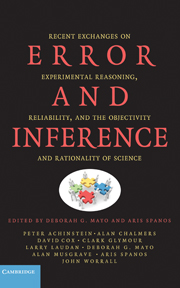 Error and Inference
Error and Inference Book contents
- Frontmatter
- Contents
- List of Contributors
- Preface
- Introduction and Background
- 1 Learning from Error, Severe Testing, and the Growth of Theoretical Knowledge
- 2 The Life of Theory in the New Experimentalism
- 3 Revisiting Critical Rationalism
- 4 Theory Confirmation and Novel Evidence
- 5 Induction and Severe Testing
- 6 Theory Testing in Economics and the Error-Statistical Perspective
- 7 New Perspectives on (Some Old) Problems of Frequentist Statistics
- 8 Causal Modeling, Explanation and Severe Testing
- 9 Error and Legal Epistemology
- Index
- References
3 - Revisiting Critical Rationalism
Published online by Cambridge University Press: 29 January 2010
- Frontmatter
- Contents
- List of Contributors
- Preface
- Introduction and Background
- 1 Learning from Error, Severe Testing, and the Growth of Theoretical Knowledge
- 2 The Life of Theory in the New Experimentalism
- 3 Revisiting Critical Rationalism
- 4 Theory Confirmation and Novel Evidence
- 5 Induction and Severe Testing
- 6 Theory Testing in Economics and the Error-Statistical Perspective
- 7 New Perspectives on (Some Old) Problems of Frequentist Statistics
- 8 Causal Modeling, Explanation and Severe Testing
- 9 Error and Legal Epistemology
- Index
- References
Summary
Critical Rationalism, Explanation, and Severe Tests
This chapter has three parts. First, I explain the version of critical rationalism that I defend. Second, I discuss explanation and defend critical rationalist versions of inference to the best explanation and its meta-instance, the Miracle Argument for Realism. Third, I ask whether critical rationalism is compatible with Deborah Mayo's account of severe testing. I answer that it is, contrary to Mayo's own view. I argue, further, that Mayo needs to become a critical rationalist – as do Chalmers and Laudan.
Critical Rationalism
Critical rationalism claims that the best method for trying to understand the world and our place in it is a critical method – propose views and try to criticise them. What do critical methods tell us about truth and belief? If we criticize a view and show it to be false, then obviously we should not believe it. But what if we try but fail to show that a view is false? That does not show it to be true. So should we still not believe it?
Notoriously, the term “belief” is ambiguous between the act of believing something (the believing) and the thing believed (the belief). Talk of “reasons for beliefs” inherits this ambiguity – do we mean reasons for believings or reasons for beliefs? Critical rationalists think we mean the former. They think there are reasons for believings that are not reasons for beliefs.
- Type
- Chapter
- Information
- Error and InferenceRecent Exchanges on Experimental Reasoning, Reliability, and the Objectivity and Rationality of Science, pp. 88 - 124Publisher: Cambridge University PressPrint publication year: 2009
References
- 2
- Cited by
